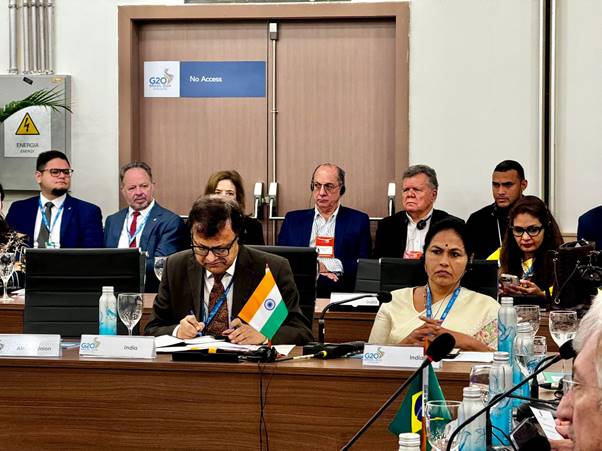Fortaleza, Brazil: The G20 Labour and Employment Ministers’ Meeting (LEMM) culminated in the approval of the Labour and Employment Ministerial Declaration on July 26, 2024. The two-day meeting, held under the presidency of Brazil, saw active participation from ministers of the G20 nations, including the Indian delegation led by Minister of State for Labour and Employment Shobha Karandlaje.
During the LEMM, ministers engaged in discussions on key focus areas such as Just Transition, the creation of quality jobs, promotion of decent work, gender equality, and the use of technologies to improve quality of life. The declaration emphasizes the importance of governments developing active inclusion policies to foster sustainable and inclusive economic growth, formalize jobs, and promote decent work through effective labor market policies.
In her remarks on Just Transitions, Karandlaje highlighted the need for skilling and reskilling to ensure a fair shift to greener alternatives. “Just transitions encompass various dimensions, including protecting workers and communities affected by the phasing out of carbon-intensive industries. It requires a robust framework of social protection, retraining programs, and investments in sustainable industries,” she stated.
Karandlaje also detailed India’s efforts in creating quality jobs and promoting decent work. She informed that India has generated over 80 million employment opportunities from 2017-18 to 2021-22 and reduced the youth unemployment rate from 17.8% in 2017-18 to 10% in 2022-23. She highlighted initiatives like ‘One Nation, One Ration Card’ and the Ayushman Bharat Scheme, which have significantly impacted health security and food accessibility for migrant workers.
On gender equality, Karandlaje emphasized India’s legislative measures, including the Sexual Harassment of Women at Workplace (Prevention, Prohibition, and Redressal) Act, 2013, the Equal Remuneration Act, 1976, and the extension of paid maternity leave from 12 weeks to 26 weeks.
Regarding the use of technologies, she pointed out the success of India’s Digital India Mission, which has opened new avenues for entrepreneurship and employment. The e-Shram portal, launched in 2021, has registered over 298 million informal sector workers and is linked to the Skill India digital portal to enhance skilling opportunities. Additionally, Aadhaar has facilitated financial inclusion by enabling millions to open bank accounts and access direct benefit transfers. However, she stressed the need for robust regulatory frameworks to address data privacy, cybersecurity, and ethical considerations of AI.





